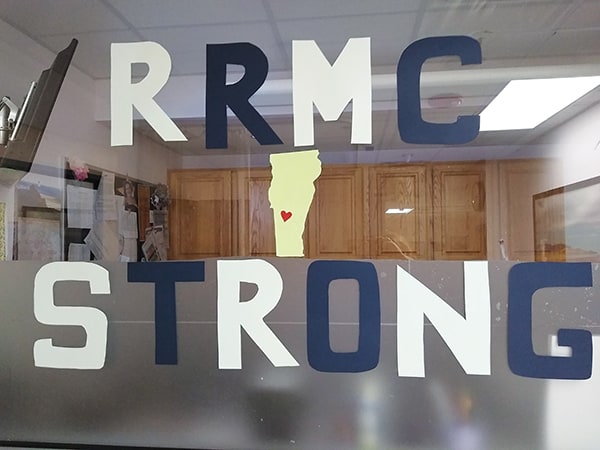By Katy Savage
While Covid restrictions are easing and a sense of normalcy is returning, hospitals are far away from “normal.”
“We still have patients in the hospital, we still have patients in the ICU that have Covid,” said Rick Hildebrant, the chief medical information officer at Rutland Regional Medical Center. “We’re still dealing with this everyday.”
It’s been two years since the pandemic started and Rutland Regional is preparing to deal with Covid cases for years to come.
“There’s going to be lasting effects, probably forever,” Hedinbrand said.
The hospital is stocking personal protective equipment (PPE) —something it never did in the past. Hospital protocols are still “locked down” to minimize staff exposure and the physical layout of the hospital has changed to tackle airborne diseases.
The number of Covid patients in Vermont hospitals dropped to just 18 on Wednesday, March 9— the lowest since last summer — but there are lingering challenges from the pandemic.
“The past four months were the most crucial for us,” Rutland Regional CEO Claudio Fort said.
In May 2021, when Gov. Phil Scott began easing restrictions, “a lot of people have been flooding back to the hospitals,” Fort said. “We’ve been playing catch up ever since.”
The number of people coming for non-emergency surgery, plus the surge of Omicron, combined with the busier winter season, took a toll.
“We kind of had the perfect storm this past fall and winter,” Fort said.
Fort said the hospital was at capacity in January. “We would manage it shift by shift,” Fort said. “There were literally no beds available. We did a lot of juggling and moved staff around from unit to unit.”
And, while the hospital deals with a high patient volume, Fort said staffing challenges have been the worst in his 30 years.
It’s not unusual for the hospital, which employs 1,700 people, to have 50-70 open positions. “In the past year, that has grown to 180-200 openings,” Fort said.
The hospital had 200 open positions in early March — 80 of which were for nurses.
“That’s the biggest area now that we’re trying to fill,” Fort said. “The struggles of the past two years have first and foremost impacted our nurses who have been on the front lines.”
The staff shortage has required the hospital to bring in 40-50 traveling nurses — a significant financial burden considering the cost has jumped 300% the past two years.
“We bring in travelers because we feel we have no other option,” Fort said.
To retain employees, the hospital increased pay for staff, such as food nutrition service workers, to $15 an hour. Starting pay for nurses increased 10% in the fall, to about $63,000 a year. The hospital also established a retention bonus. Employees get an 8% bonus every quarter, based on quarterly earnings.
Hildebrant said a number of people have recently left the healthcare field. Nurses have quit their full time jobs to become travelers because the pay rate is higher.

“RRMC Strong” adorns the diabetes insipidus nursing window at Rutland Regional Medical Center.
“It’s really hard to work in health care in a pandemic,” Hildebrant said. “We didn’t see this coming.”
The increase in patients at the hospital has brought higher than expected revenue, but Fort said he was projecting a 3% operating loss this fiscal year. The hospital usually has a 2% operating margin.
“All those wage increases we have done — those weren’t in the budget,” Fort said. “We did it because we needed to keep up.”
It’s unclear how the rising cost of equipment and salaries will affect the cost of care. Rutland Regional asked the Green Mountain Care Board for a rate increase at the end of February. The request was pending in early March.
Despite the challenges, hospital staff are looking toward the future. Rutland Regional started allowing patients to have up to two visitors last month.
“We need to figure out how to go from where we are now to a future state where there’s less restriction,” Hildebrant said.
Rutland Regional added air filter machines with the help of Covid relief funds provided by the federal government and has rearranged beds to make sure it’s ready not just for future Covid variants, but for other diseases, too.
“We want to make sure the physical plant of this building can handle whatever disease comes down the pipe,” Hildenbrant said.
“Fundamentally nothing has changed in the world,” Hildebrant added. “We’ve had few global pandemics before this that were smaller,” he said, mentioning the 2003 outbreak of severe acute respiratory syndrome (SARS). ”We’ll have another,” he added.
Fort was cautiously optimistic about the future. “We’re hoping we’re at the tail end of this,” Fort said. “We’re working to restore more normal operations at the hospital.”
However, Fort said hospitals won’t feel the impact of “normal” right away.
“The only fear that I have is that people are so fatigued and they’ve been so stressed by Covid,” Fort said. “People are yearning to get back to normalcy. The one thing we’ve got to realize is that Covid has fundamentally impacted health care. It is going to be a long recovery.”




